Shortly after President Trump took office in January 2017, then-National Security Advisor Michael Flynn unexpectedly took the podium at the daily press briefing. He used the opportunity to denounce Iran for “actions…that undermine security, prosperity and stability throughout and beyond the Middle East, that put American lives at risk,” adding that “we are officially putting Iran on notice.” Flynn was ousted only days later. Still, his heated warning has lingered, the first sign of gathering storm clouds of renewed acrimony between Washington and Tehran.
Seven months later, the Trump administration is readying a comprehensive new Iran policy—one that reflects more thorough consideration than Flynn’s impromptu threats, but that builds on the same pugnacious determination to confront Iran. A central element of this strategy concerns the fate of the 2015 Iran nuclear agreement, known as the Joint Comprehensive Plan of Action (JCPOA), which President Trump has denounced as “the worst deal ever.”
Reports that Trump may take steps to unravel American adherence to the JCPOA have revived the ferocious debate over the agreement, which was a pivotal Obama administration achievement and elicited intense partisan backlash from the start. On the op-ed pages and airwaves, the pro-deal “echo chamber” and its equally well-oiled opposition have suited up for another round of fierce argumentation over the nuclear agreement.
Here’s the problem: The debate over the nuclear deal is a red herring. Like it or hate it, the Iran nuclear agreement addressed only one element of the challenge posed by Tehran—a complex, combustible labyrinth of problematic policies that have wreaked havoc within Iran and across the broader Middle East. Instead of re-litigating the well-traveled turf surrounding the JCPOA, what Washington needs now is a credible strategy for addressing the perennial, unresolved question of how to persuade Tehran to play a more constructive role at home and abroad.
Inopportune timing
That is easier said than done. Since Iran’s 1979 revolution transformed its government from a reliable American ally to an implacable adversary, each U.S. president has entered office determined to contain or even roll back Iran’s support for terrorist groups and efforts to destabilize its neighbors. And yet over the course of nearly four decades, decisive and durable American gains in the struggle with Iran have been few and far between, and too often ephemeral.
The situation today is even more inauspicious than at any other point in recent memory. After a precarious period of internal instability and international censure and sanctions, the Islamic Republic has consolidated its domestic legitimacy, repaired its frayed relationships with key European trade and diplomatic partners, deepened a nascent strategic partnership with Russia, and markedly expanded its reach across a chaotic Middle East. Tehran’s regional posture creates vulnerabilities, to be sure, but exploiting them will only come at some real cost for Washington, especially for an administration that is determined to avoid further entanglements in the messy wars of the Middle East.
Still, the persistence and complexity of the Iran challenge demands a coherent U.S. response, which is only possible with a modicum of bipartisanship. That is not out of reach, even in Washington’s current mood of hyper-partisanship. In a quiet fashion, the profoundly unhelpful polarization around the nuclear deal that prevailed throughout the negotiations has already begun to modulate. In particular, while critics of the JCPOA remain adamant in their denunciation of the deal, many display far less eagerness to simply scrap it now that it is in place. This is purely a practical matter, and it underscores a political reality that has constrained the opponents since the outset: The JCPOA’s primary advantage has always been the absence of a compelling, viable alternative.
As a result, even those who find the nuclear agreement woefully weak are disinclined to scrap it without an obvious and attainable upgrade. On the other side of the aisle, many backers of the nuclear deal recognize that it has not generated meaningful improvements in Iran’s regional or domestic policies, and support U.S. efforts to address those challenges as well. This convergence—and the intricate if imperfect constraints on Iran’s nuclear activities—creates an opening for a comprehensive effort to ensure that Iran does not hold sway across the region.
The de-certification question
Thus far, however, the Trump administration seems incapable of bipartisanship, even on Iran. Since the earliest days of his campaign, the president has carved out a distinctive approach to Iran, insisting that he would renegotiate the bargain even as his Republican rivals promised to tear it up. Trump’s critique of the agreement itself is nonspecific, but unsparing; in his speech to the United Nations General Assembly, he described the JCPOA as “an embarrassment” and “one of the worst and most one-sided transactions the United States has ever entered into.” For a politician whose professional trademark is deal-making, the Iran nuclear agreement presents an irresistible opportunity for grandstanding.
This idiosyncratic interest helps to explain why the issue has arrived at this strange place. Having repeatedly invoked his disgust with the deal, Trump is apparently insistent on taking some public action to repudiate it, with the intent of resuming negotiations with Iran to achieve a stronger agreement. The mechanism he’s chosen—refusing to certify Iranian compliance with the deal in a period report to Congress—is entirely a domestic political gesture, facilitated by the determination of opponents of the Obama administration to impose Congressional review on the executive branch’s diplomatic prerogatives.
Exacerbating the awkwardness for Trump is the widely-shared assessment…that Tehran is in fact adhering to the terms of the deal.
The 2015 Iran Nuclear Agreement Review Act was a gambit that failed in its original intention, namely to scuttle the deal upon its inception. Instead, Congressional activism created an albatross of routine endorsements of the deal, which now must be undertaken by a president who intrinsically abhors it. Exacerbating the awkwardness for Trump is the widely-shared assessment, echoed by International Atomic Energy Agency and senior members of his own cabinet, that Tehran is in fact adhering to the terms of the deal. Other than a few minor compliance issues that were quickly resolved and outstanding questions about enforcing its restrictions on weapons technology, the Iranians have failed to provide a useful pretext for Trump to jettison the JCPOA entirely. As a result, de-certification will have to be predicated on the dubious proposition that the deal does not serve American national security interests, a position Trump’s own defense secretary, James Mattis, refuted only days ago.
In predictable Trump fashion, de-certification appears to be a step designed solely to assuage the president’s ego. It has no direct bearing on U.S. standing under the terms of the agreement itself, except insofar as it precipitates expedited Congressional review of the sanctions that were waived or suspended as a result of the JCPOA. And because the president cannot claim Iranian non-compliance, the administration has no prospect of generating a broader diplomatic coalition around pressuring Tehran to accept even more onerous restraints on its nuclear activities.
Compounding the absurdity, the sole consequence of Trump’s anticipated step—Congressional action to re-impose the nuclear-related sanctions on Iran—appears highly unlikely. This too is purely a practical matter; the Hill’s agenda is packed with other priorities, including tax reform, health care, and immigration; its political calendar is short; and relationships with the White House are strained, to say the least. If, as expected, President Trump de-certifies while counseling against re-imposition of sanctions, he is acknowledging the domestic political reality and exposing the hollowness of his own action. Meanwhile, the consequential uncertainty surrounding the Iran deal flies beneath the radar of the hype around de-certification: Will Trump continue to waive the nuclear-related sanctions as required by the JCPOA? The next decision point there does not come until January.
Back to bite you
Ironically, even though de-certification may not immediately implode the nuclear deal, it’s not a mere head fake. De-certification will have a significant and almost certainly disastrous impact for American diplomacy. It will provide no new leverage over Iran; it will alienate Washington’s vital partners in the designing and implementing the deal, states that are unanimous in their opposition to this move; and it will provide Tehran with an unparalleled opportunity to renege on its nuclear constraints with plausible impunity.
More specifically, it will not achieve what the president claims to want: a platform for a new, more rigorous negotiation with Iran. Instead of co-opting European eagerness to preserve the JCPOA to generate new cooperation to blunt Iran’s regional influence, the administration instead will have to engage in damage control with key allies who will view de-certification as an American betrayal of a successful partnership. And what happens with Iran doesn’t stay with Iran; de-certification will undercut the integrity and authority of U.S. commitments around the world. It may loom particularly large for the diplomatic efforts around North Korea.
What happens with Iran doesn’t stay with Iran; de-certification will undercut the integrity and authority of U.S. commitments around the world.
How Iran’s leadership may react remains to be seen. To date, Tehran has taken pains to solidify its good standing with Europe and expand economic relationships around the world, in hopes of alleviating the fallout from Trump’s hostility. But the tone has hardened considerably as new U.S. steps appear imminent; the commander of the Revolutionary Guard Corps has warned of Iranian attacks against U.S. troops in the region if Trump moves forward with designating the IRGC as a terrorist organization, as required by recent legislation.
De-certification will confirm Tehran’s deep-seated distrust of American intentions and will almost certainly encourage and expedite Iran to test the boundaries of its own adherence to the JCPOA. Add to that the impact of the administration’s broader efforts to push back on Iran’s expanded influence and reach across the region, which will likely provoke retaliatory impulses among the Iranian leadership. In other words, we can expect intensified frictions across the board with Iran, that may play out in unpredictable and potentially uncontrollable fashion.
As for the JCPOA itself, it may just survive this initial assault. Depending on how Trump handles the periodic renewal of sanctions waivers that were required by the agreement, the edifice of the agreement may remain applicable for some time to come. The Europeans are deeply invested in this agreement and, along with the other parties to the deal in Moscow and Beijing, will be reluctant to take steps that could provoke an intensification of the proliferation risks in the region. However, the fundamentals of sustaining the deal are increasingly weak. Over time, the Iranians will be tempted to edge away from their own obligations, under the expectation that the locus of blame will remain directed toward Washington as the first mover. Under this scenario, the Iran nuclear agreement could unravel slowly but unmistakably.
In search of a wider aperture
Lost amidst the furor over de-certification is the anticipated articulation of the Trump administration’s broader strategy around Iran, the culmination of a long and reportedly serious policy review. Absent President Trump’s fixation on scuttling the nuclear deal, his administration might have had an opportunity for generating newfound bipartisan consensus and multilateral cooperation around on an Iran strategy that attempts to tackle the real challenge presented by Tehran’s destabilizing policies across the region.
This missed opportunity represents an important strategic misstep by the administration that goes beyond the steep price that may be paid in terms of the durability of the nuclear deal. The nuclear crisis dominated the framing of U.S. policy toward Tehran during the Obama administration—understandably given the pace and scope of Iran’s nuclear program between 2009 and 2013. But it came at the cost of devising and implementing more robust initiatives to contain Iran’s exploitation of regional conflicts in order to achieve a predominant position across the Levant.
For all its limitations, the JCPOA created the breathing space around the nuclear crisis to enable just that widening of the lens—which makes Trump’s revival of the obsessive debate around the deal so maddeningly counterproductive. Now should be the time for both sides of the Washington debate on Iran to come out of their foxholes and find common ground around a serious strategy for promoting peace and stability in the broader Middle East—including efforts to address the unavoidable compromises in the JCPOA, such as seeking to extend to its sunset provisions. Instead, the Trump administration is on the verge of upending the hard-fought checks on Tehran’s nuclear ambitions based on nothing more than hubris. In this part of the world, the illusion of something better just beyond the horizon is called a mirage, and the American presidents who pursue them are seldom successful.
The Brookings Institution is committed to quality, independence, and impact.
We are supported by a diverse array of funders. In line with our values and policies, each Brookings publication represents the sole views of its author(s).
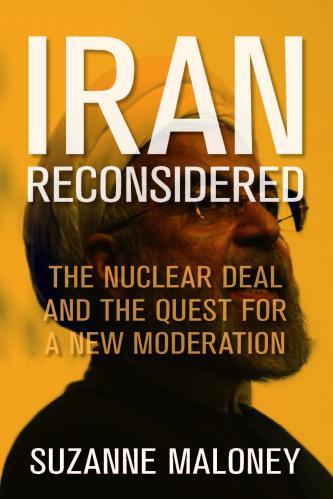
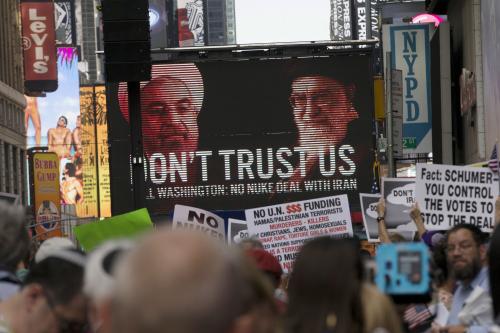
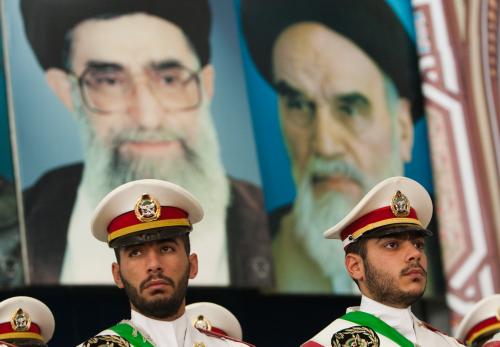


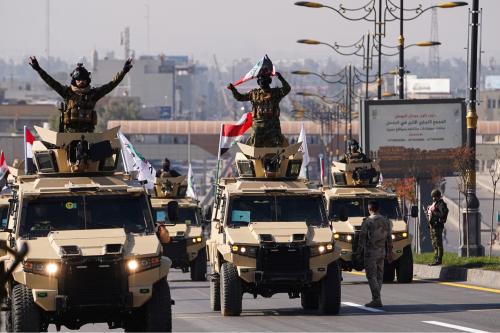
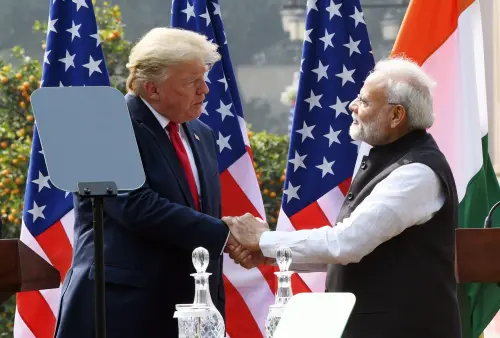
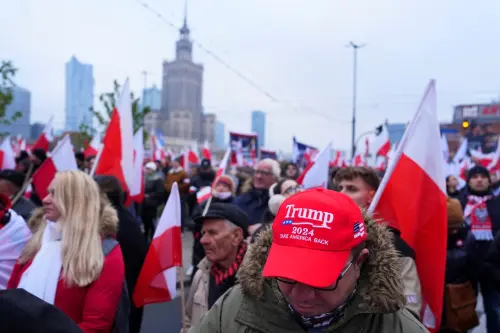
Commentary
To certify or not to certify? That’s not the question
October 10, 2017